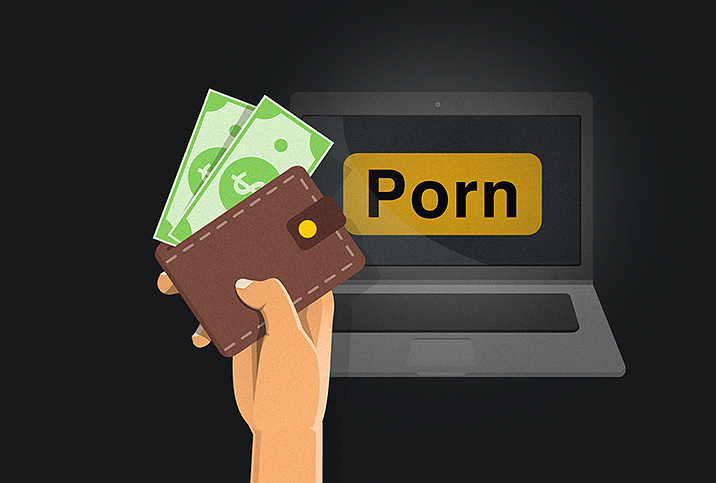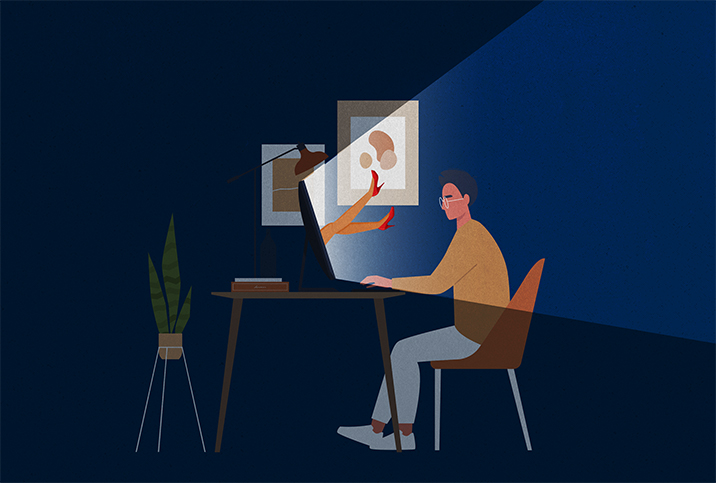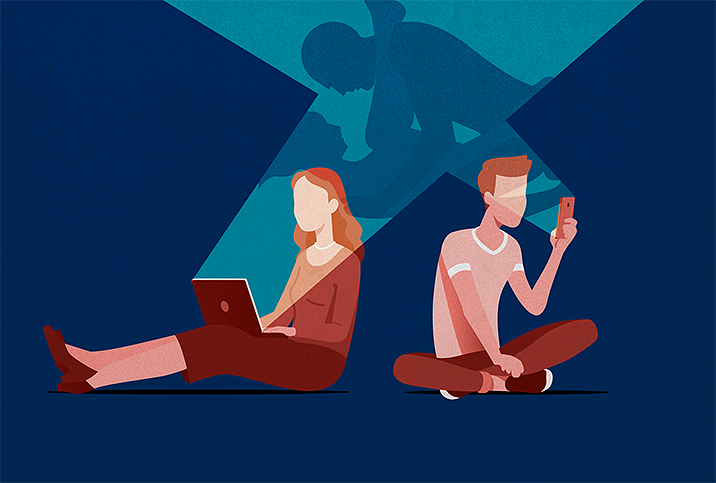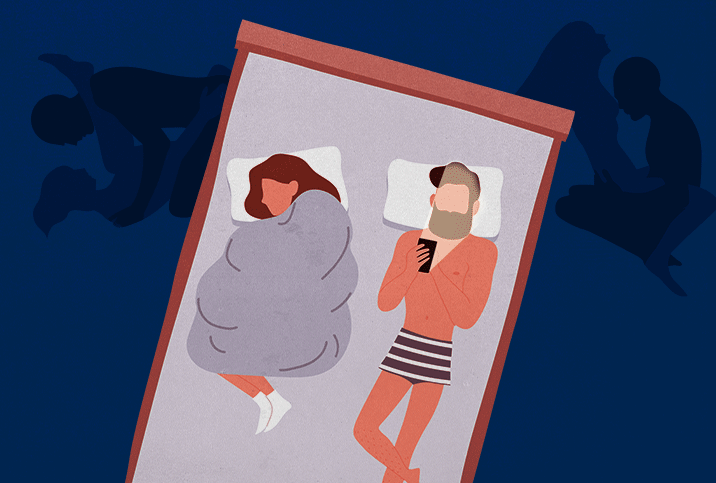When You Don't Pay For Your Porn, Someone Else Does

For a great number of smut-seekers, "free porn" and "internet porn" are effectively synonymous. When the adult film industry's former revenue models collapsed during the digital revolution, sites such as Pornhub and xHamster filled the content void, training an entire generation to stream their skin flicks for free. Nearly 20 years on, there's more free porn online than ever, a development driven by the ubiquity of these sites.
But perhaps "free" is the wrong way to think about this content. Porn you don't pay for comes with a human cost, as the piracy that delivers it to the masses has decimated the livelihoods of adult performers and endangered their safety.
Precise facts and figures on the adult film industry's value are hard to come by, because most of the major players aren't publicly traded. However, observations of its restructuring since its "golden age" in the 1970s and '80s reveal grim trends. Megastars like Jenna Jameson don't seem to exist anymore, because the multiyear studio contracts that top performers once commanded no longer exist, either. As Italian performer Valentina Nappi told Vice last year, "These days, you're paid per scene. Getting an exclusive contract is quite rare."
This industry shift has resulted in more and more porn performers turning to full-service sex work—for example, jobs that involve in-person sexual contact with a client—to supplement their income, according to a 2018 article in Socius: Sociological Research for a Dynamic World. Performers have also seen the average length of their careers plummet by more than 60 percent since the 1970s, according to data journalist Jon Millward's 2013 analysis of the Internet Adult Film Database.
This downward fiscal trajectory can be attributed to the volume of free porn available online and the way it's collected. Most free porn is available via "tube sites," so called for being modeled after YouTube. Just like their namesake, tube sites acquire their videos via user uploads and collect revenue from ads placed on those videos. The problem is these users frequently post copyrighted material that's been stolen from independent creators. From there, it's often dispersed across dozens of platforms, making most attempts at removal futile.
A domino effect
After a New York Times report by Nicholas Kristof in December 2020 spotlighted the volume of rape videos and child porn on Pornhub, the company swiftly purged the platform of content from unverified users. However, this was a blunt tool that had unanticipated consequences, particularly once Visa and Mastercard decided to withdraw from the platform two days later, leaving independent creators with concerns about their revenue streams. "The breadth of this decision, and whether it will trickle down to other websites, cam sites or other platforms, and whether it will interfere with broader credit card transactions is yet unknown," read a statement released by the Adult Performance Artists Guild following the latter decision.
Removing nonconsensual content from porn platforms was a noble goal, but the chosen solution left legitimate creators with uncertain revenue streams and did not address the rampant piracy of their creations. To avoid that problem, performers are flocking to direct-to-consumer platforms such as OnlyFans and creating content that's built to a specific client's tastes.
Porn you don't pay for comes with a human cost, as the piracy that delivers it to the masses has decimated the livelihoods of adult performers and endangered their safety.
For Paulita Pappel, a porn producer and performer, it's frustrating to shoulder the burden of stolen content while regulators look the other way.
"While other industries have regulated the piracy on big platforms, there's been a complete lack of action on porn piracy for too long, and it still isn't being addressed properly," she said.
Pappel is a director and producer for erotic film studio HardWerk and docu-porn platform Lustery, as well as a curator for the Pornfilmfestival Berlin. Across these various roles, fighting piracy is practically part of the job description. Pappel said she finds site rip-offs of Lustery content "daily," and works with an external antipiracy company to handle the DMCAs (Digital Millennium Copyright Act), or takedown notices, that the platform must repeatedly file. Additionally, the platform digitally fingerprints each video using software that can identify and summarize a video's unique characteristics for later comparison, and runs daily searches for stolen content.
Despite expending so much energy and capital on the fight, to Pappel, "it feels like a never-ending war that we can't win."
The casualties of war
Pornhub is the crowned king of the tube sites, but once upon a time, it had actual competitors in sites including YouPorn and RedTube. Today, all three are owned by Pornhub's massive international parent company, MindGeek, which also owns dozens of film studios in the United States. MindGeek's tentacles stretch so far that it's nearly impossible for performers to participate in the industry without using its services. This amounts to the company controlling both production and distribution for a wide swath of the porn industry, compelling studios to crank out content to feed the tube sites. This Ouroboros business model drives down production budgets and performer wages, so MindGeek can boost its own profits with ad dollars.
Of course, it's the insatiable appetite for fresh content that incentivizes piracy on such a massive scale, and there's no real incentive for MindGeek to solve that problem. The company does run a scheme in which it helps creators remove stolen content from the few remaining competitor tube sites, but only if they enter into an exclusivity arrangement with the company first, pledging to upload their videos to Pornhub and no other free sites.
As MindGeek continues to corner the porn industry, the performers and studios that generate its wealth have been sidelined on its journey to becoming NSFW Netflix. Fortunately, the public has become a powerful new ally in the fight for sex workers' rights.
Liberation isn't free
Sex work became a mainstream political issue in 2018 after the U.S. passed SESTA/FOSTA, a set of laws advertised as "anti-trafficking" that effectually prohibited sex workers from using the internet for advertising or information sharing, and curtailed sexual expression online.
Grassroots opposition spread like wildfire on social media, and suddenly, politicians were being questioned in broad daylight about their support for sex workers' safety and autonomy. Younger adults in particular have taken up the cause, and millennials now make up the largest share of paying porn consumers. It's indicative of a new collective willingness to consider the value of erotic labor in our society, and the well-being of the individuals who provide it.
In the digital era, those individuals are a lot more diverse than they used to be. People who would have struggled to find work during the industry's golden age, including disabled, overweight, queer, trans and non-white performers, can now carve out space online. For creators without a studio apparatus behind them, the internet facilitates safe and direct contact with clients, with whom long-term arrangements can develop.
For example, Gwen Adora, an award-winning porn clip artist, said she becomes "ecstatic" when the usernames of her regulars pop up in her "sold" notifications on OnlyFans.
"Knowing my fans are buying my content consistently allows me to not worry about my basic needs, and I can put more positive energy into the content they enjoy," Adora said.
With any luck, the "free porn" epoch will be just a blip in early internet history, and consumers will fit erotic entertainment into their budgets the same way they do services such as Spotify and Hulu. Pornography is among the most widely consumed entertainment on the planet, and the industry's not going anywhere soon. The models and performers who create it are entitled to fair compensation, just like other workers.


















